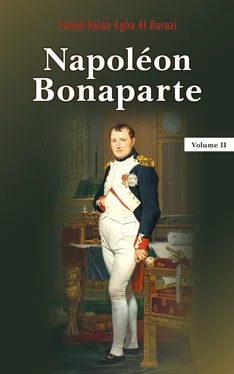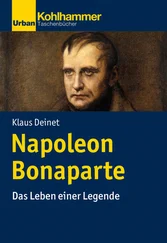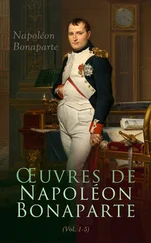Fahed Aslan Agha Al Barazi - Napoléon Bonaparte
Здесь есть возможность читать онлайн «Fahed Aslan Agha Al Barazi - Napoléon Bonaparte» — ознакомительный отрывок электронной книги совершенно бесплатно, а после прочтения отрывка купить полную версию. В некоторых случаях можно слушать аудио, скачать через торрент в формате fb2 и присутствует краткое содержание. Жанр: unrecognised, на английском языке. Описание произведения, (предисловие) а так же отзывы посетителей доступны на портале библиотеки ЛибКат.
- Название:Napoléon Bonaparte
- Автор:
- Жанр:
- Год:неизвестен
- ISBN:нет данных
- Рейтинг книги:4 / 5. Голосов: 1
-
Избранное:Добавить в избранное
- Отзывы:
-
Ваша оценка:
- 80
- 1
- 2
- 3
- 4
- 5
Napoléon Bonaparte: краткое содержание, описание и аннотация
Предлагаем к чтению аннотацию, описание, краткое содержание или предисловие (зависит от того, что написал сам автор книги «Napoléon Bonaparte»). Если вы не нашли необходимую информацию о книге — напишите в комментариях, мы постараемся отыскать её.
Napoléon Bonaparte — читать онлайн ознакомительный отрывок
Ниже представлен текст книги, разбитый по страницам. Система сохранения места последней прочитанной страницы, позволяет с удобством читать онлайн бесплатно книгу «Napoléon Bonaparte», без необходимости каждый раз заново искать на чём Вы остановились. Поставьте закладку, и сможете в любой момент перейти на страницу, на которой закончили чтение.
Интервал:
Закладка:
Caulaincourt had correctly warned his master, to no avail.
In May 1811 Alexander had written Frederick William King of Prussia, saying “I intend to do what Wellington had done in Spain; exhaust the French armies by avoiding pitched battles, organize long lines of communications for retreat leading to entrenched camps.” All the while Alexander was dissimulating to the French Ambassador Caulaincourt, protesting his loyalty to Napoléon, while in reality he was preparing for war. Napoléon, for his part, was not to be flummoxed by Alexander’s words. On February 28, 1811, he wrote: “Your Majesty’s Ukase of Dec. 31 was specifically directed against France. Therefore in the view of England and Europe our alliance no longer exists.” As for Poland, Napoléon warned “it was French territory. I therefore insist that no one interfere in what I do beyond the Elbe.” When Napoléon received disquieting reports that recent Russian fortifications have been raised along the River Dvina, he wrote, “I am amazed by this evidence and Your Majesty coming to an arrangement with England. This I consider tantamount to stoking the fire of war between our Empires.”
While Alexander continued to protest to Caulaincourt his friendship to Napoléon, he was, in fact, preparing for war. His approaches to Prussia and Austria for an alliance proved fruitless; the two monarchs were not prepared to risk Napoléon’s wrath while his armies were fully prepared to wreak havoc on their kingdoms and strip them of additional territory. In April 1812, the Tzar told Czartoryski, “A rupture with France seems unavoidable. Napoléon wants to destroy the last standing power in Europe. He wants to deprive us of the only trade left to us with neutrals.”
When it is in the interest of France, Napoléon disregards his own prohibitions; he exempts urgently needed raw materials and grants licenses for import including dyes from England to satisfy the luxurious taste of Parisians. To circumvent the rife contraband business enjoyed by smugglers, and turn the profit to the French Coffers, Napoléon imposes a 50 percent duty on all illicit products seized by his agents on the French occupied territories.
The English retaliate by countermeasure, demanding from all neutral countries exorbitant dues for permission to call on blockade ports. The French counter by issuing decrees stipulating that all neutral vessels calling at the ports of London or Malta run the risk of capture as trophy of war.
The onerous financial consequences of the Continental System had afflicted the entire continent, in particular, England and France. The Iberian war had further drained the finances of France, with 250,000 Frenchmen tied up in a seemingly endless war of attrition; Napoléon, in 1811, still could not come to terms with the idea of withdrawing his troops and cut his losses.
Looming on the horizon, a distant threat, was Bernadotte; Napoléon distrusted ‘this Jacobin’, as he called him. During the French military presence in Swedish Pomerania, Bernadotte had made friends amongst the Swedish circles. His ascension to the Swedish throne came by fluke; when Napoléon forced the anglophile Swedish King to abdicate, replacing him with his uncle, an ardent supporter of Napoléon. The childless, old king, to please the Emperor, appointed Bernadotte, Joseph’s brother-in-law, as his successor; a poor choice for Napoléon, which he approved, when asked if he had any objections to nominating his subaltern for the Swedish throne. Bernadotte, always jealous of the emperor and humiliated at Wagram when the emperor had sent him off the field in disgrace, would bide his time to take his revenge; in 1813, he took the field at Leipzig against his master of yore.
Not before long, the emperor would be betrayed by Marshal Murat, King of Naples, and Augereau, as events will show in 1813; but now in 1811-1812, he still believed in his lucky star and the confidence of passing his good fortune to his son and heir. When a great reception was held after the birth of his son, among the elite guests was the Austrian Ambassador Prince Schwarzenberg, who was instrumental in promoting the marriage. The Emperor moved with gratitude, went to Princess Schwarzenberg, took a Scarab pin from his coat and presented it to her, saying: “I found this scarab in the tomb of an Egyptian King and have ever since worn it as a talisman. Please accept it, I no longer need such an amulet.”
Napoléon’s relationship with the Pope had deteriorated; Pius VII was removed to Savona, and kept there a virtual prisoner, deprived from his advisers and his papers. When the recalcitrant Pope threatened not to recognize the divorce, Napoléon retaliated by summoning a council of prelates from the empire. Threatened by an extorted decree from the prelates of depriving the Pope of the investiture in case of refusal to concede to the divorce, the Pope relented and agreed to the divorce. The Pope ultimately excommunicated the Emperor; this act had hardly left an impression on Napoléon’s ground accomplishments, for he had brought Catholicism back to France; the Concordat was a milestone accomplishment, the code de Napoléon had been surprisingly accepted by the inhabitants of the Papal Sates, and his vigorous road construction, drainage of the pontine marshes and embellishment of Rome’s parks added to his rising prestige amongst the Italian Populace.
When visiting the newly annexed Holland, in another jibe at the Pope, he reproached the welcoming Bishops in the presence of the Dutch Protestant clergy: “Are you of Gregory’s religion? Well I am not! Mine is the religion of Christ who said: “Render unto Caesar what is Caesar’s and unto God what is God’s.” I am ordained by God. What proof have you that Jesus had appointed the Pope his Viceregent and that the Pope has the right to excommunicate an Emperor!?” The bewildered clergy kept their peace.
More pressing for the Emperor were his vigorous projects in embellishing Paris and making it the cynosure of European capitals. He ordered the construction of an east-west route across the capital and instructed his favourite architects, Fantaine and Percier, to construct the long, straight, arcaded Rue de Rivoli. On the far side of the Place Vendome, he constructed another straight street, the Place de la Paix, linking with the Rue de Castiglione. These new streets were a striking difference from the network of winding alleys.
In 1806, to honour the Grande Armée, he ordered the building of a temple modelled on the Parthenon. Inside, names of every soldier who had fought in Austeria and Germany would be engraved on marble plaques. For this, he chose the site north of the Place de La Concorde. The building would take about seven years to complete. For this, he commissioned the architect Vignan.
His bee-like activities were not limited to his campaigns; he embarked on building projects one after the other, each having its own purpose and message. Most of all, Napoléon’s own ideas through architecture were to leave an everlasting impression on the French and the World. In the Louvre, he added a new wing to join the Tuileries; for that purpose, he commissioned Fontaine and Percier and added a fountain in one of the courtyards. On inspecting it, he noticed a group of naiads spouting water from their breasts. He ordered; “Remove those nodrizas. The naiads were virgins.”
Napoléon takes credit for commissioning the Bourse building in Paris, the building of the Arc de Triomphe de l’Etoile, a monument dedicated to the Grande Armée, went beyond the neo-classic style; “A monument dedicated to the Grande Armée must be majestic, large and not influenced by antiquity”. Another less imposing arch stands at the entrance of the Tuileries (since then the entrance has changed); this graceful Arch is supported by four red marble columns on each side. Bronze horses were placed on the top of the Arch; during Napoléon’s absence in Spain, Denon, the painter that Napoléon commissioned during his Egyptian campaign to draw Egyptian antiquities, added a chariot and a statue of Napoléon. When Napoléon returned, he had the statue removed commenting: “The arch is designed to glorify the army that I have the honour to command; remove my statue.”
Читать дальшеИнтервал:
Закладка:
Похожие книги на «Napoléon Bonaparte»
Представляем Вашему вниманию похожие книги на «Napoléon Bonaparte» списком для выбора. Мы отобрали схожую по названию и смыслу литературу в надежде предоставить читателям больше вариантов отыскать новые, интересные, ещё непрочитанные произведения.
Обсуждение, отзывы о книге «Napoléon Bonaparte» и просто собственные мнения читателей. Оставьте ваши комментарии, напишите, что Вы думаете о произведении, его смысле или главных героях. Укажите что конкретно понравилось, а что нет, и почему Вы так считаете.












